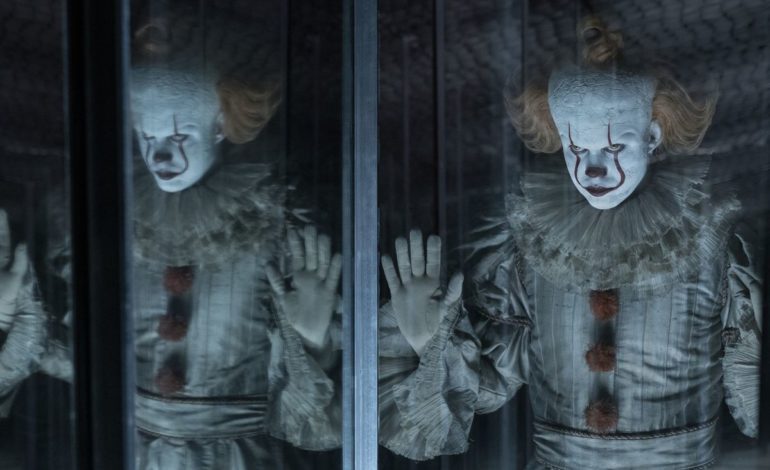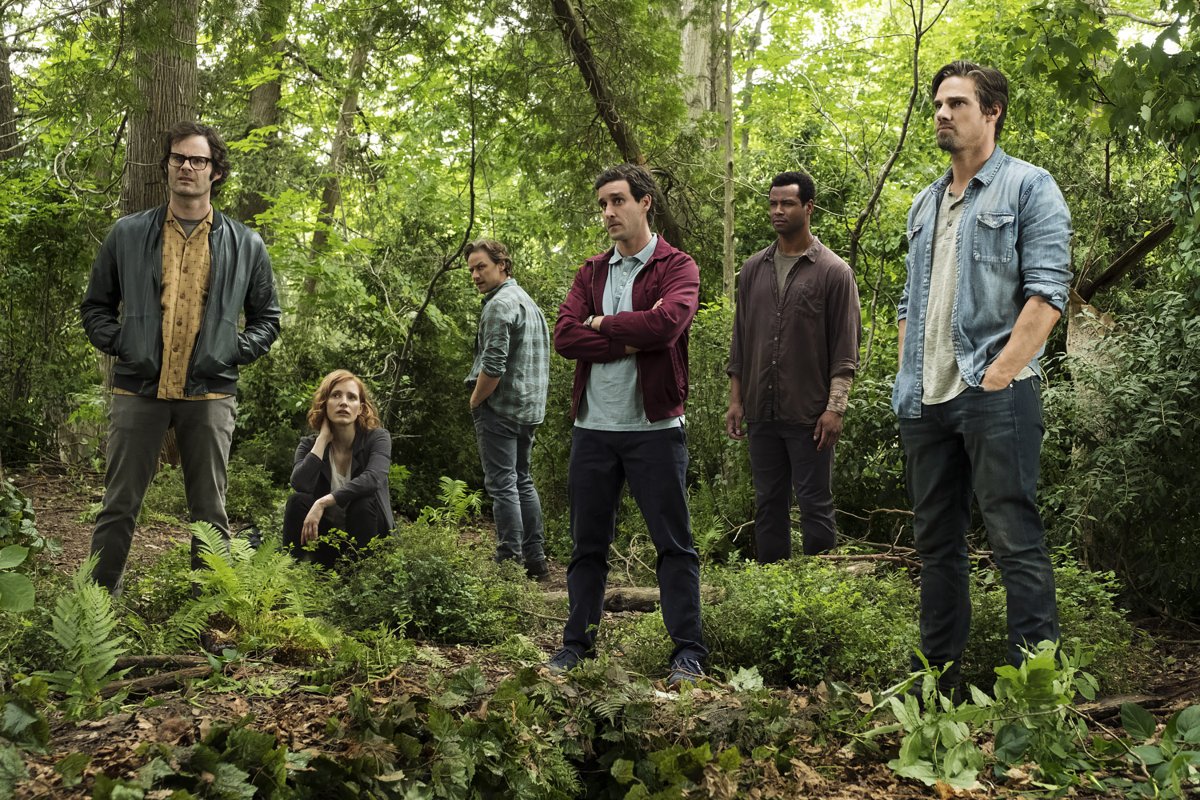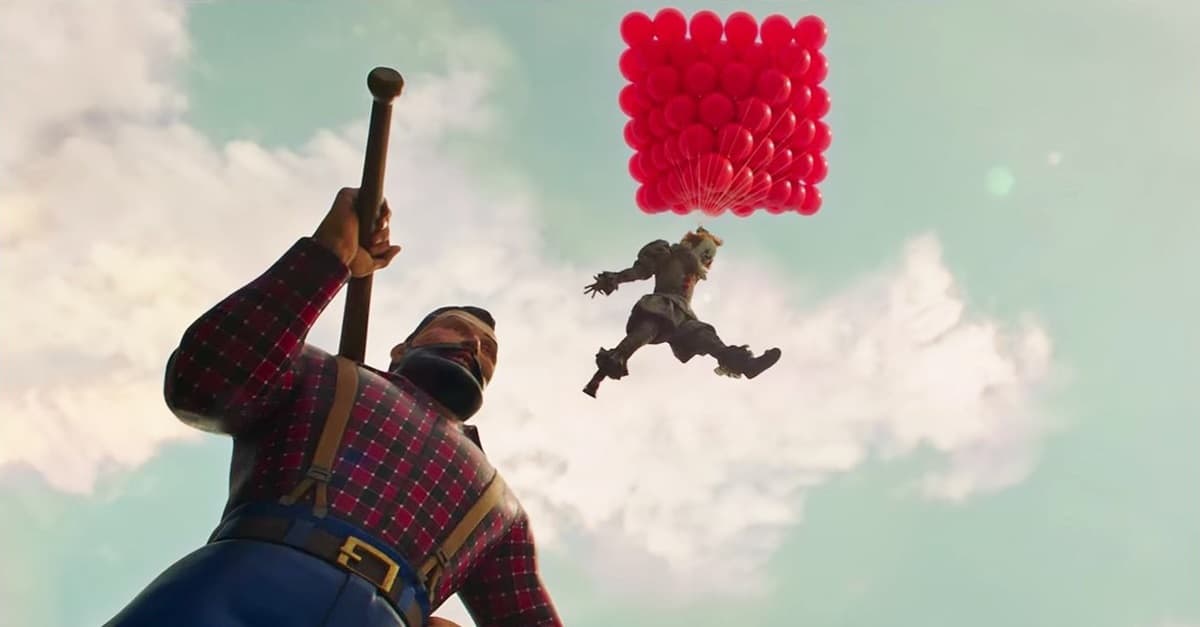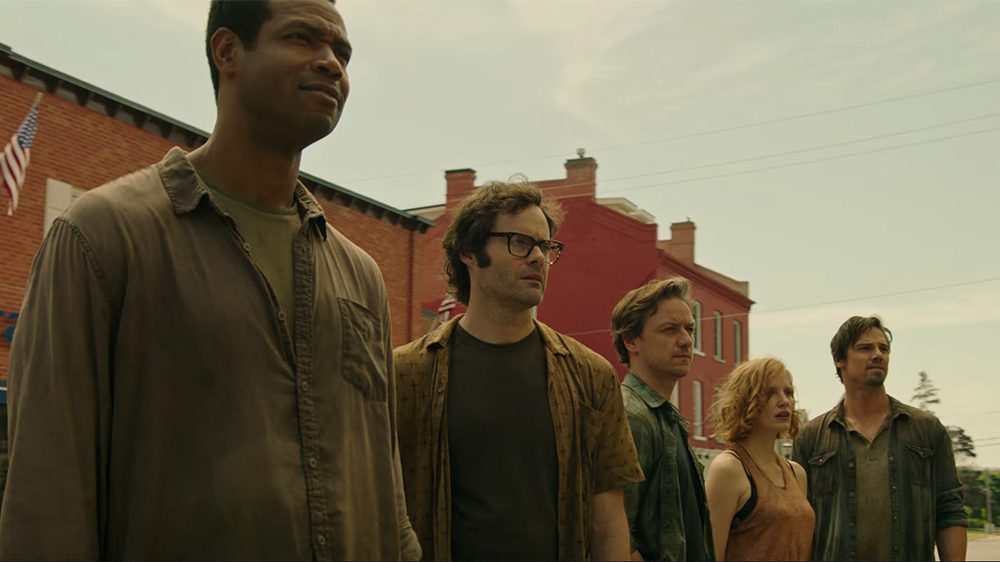

In one visually compelling scene in IT Chapter Two, Bill Denbrough (James McAvoy) sprints into a carnival funhouse to save a child from Pennywise the Dancing Clown, also known as the titular “IT” (Bill Skarsgård). Bill frantically makes his way through each stage of the funhouse, first staggering through a hypnotically spinning tunnel, then weaving and bobbing through a black-lighted hallway full of punching bags with clowns painted on them, swinging like pendulums.
This is how IT: Chapter Two feels: a sequence of individual horror setups, a string of creepy vignettes that don’t necessarily fit together, breathlessly leading audiences through one meticulously themed room after another. Bill eventually faces off with Pennywise in a hall of mirrors, but only after repeatedly smashing into the walls, dizzied by the infinite reflections of his own image. Like Bill, the film—with its many callbacks to Chapter One as well as meta jokes about its source material’s author—gets in its own way, clumsily struggling with its own self-image.


Andrés Muschietti returned to direct this sequel to his 2017 film IT, now also known as IT Chapter One. Horror veteran Gary Dauberman (The Conjuring Universe films, The Nun) also contributed to the screenplay for Chapter One, but wrote Chapter Two solo. The story is catalyzed by Mike Hanlon (Isaiah Mustafa of Old Spice fame) calling each of his childhood friends—Bill, Richie Tozier (Bill Hader), Beverly Marsh (Jessica Chastain), Ben Hanscom (Jay Ryan), Eddie Kaspbrak (James Ransone), and Stanley Uris (Andy Bean), also known as the “Losers Club”—asking them to keep the promise they made 27 years ago after defeating Pennywise. That promise, as shown in the conclusion of IT Chapter One, was to come back to their hometown of Derry, Maine if It ever returned.
The Losers reluctantly unite to kill It for good. One problem: besides Mike, they can hardly remember anything about It. Derry is an unusual town; once you leave, your memories of it fade at a highly accelerated rate. Much of IT Chapter Two follows the Losers’ attempts to remember what exactly happened that summer, going from character to character as each one revisits a specific location and recalls how It terrorized them there.
Mostly, this structure adds up to a whole lot of scenes rather than one cohesive movie. It starts to feel like a chore after a while, roll-calling each character and their “monster of the week” moment. The film also jam-packs itself full of needless allusions to other works by Stephen King; if I wanted to be bombarded with King’s greatest hits, I’d just watch Castle Rock on Hulu. There are frequent direct references to Chapter One as well, which are easy to gloss over or get confused by if you don’t watch the two movies back-to-back.


Although the film’s over-reliance on It iconography and awkward pacing leads to an overall sense of disjointed predictability, its checklist formula works in one particular case: Richie’s. Richie’s flashback sequence and encounter with Pennywise bring a surprising new amount of depth to both his character and the overall story. This also gives Bill Hader (who has recently proven his serious acting abilities in HBO’s Barry) a well-deserved chance to show off his acting chops in a part with more emotional range than he ever got to play in Saturday Night Live. Unlike the flashbacks involving Beverly, Ben, and Bill’s love triangle, which only culminate in eyeroll-worthy, chemistry-less moments between their adult counterparts, Richie’s main scene interconnects with the rest of the story—particularly regarding Eddie—and ties the movie’s emotional narrative together. It also gives more weight to the scene in which a gay couple (one member whose sassy wit and pure fiery defiance are perfected by indie actor Xavier Dolan) in modern-day Derry become victims of a despicable hate crime.
While Richie and Eddie are overflowing in the personality department, other characters fall short. Mike almost never takes part in banter among the Losers and, when he does speak, it’s only to lecture the characters and audience about the plot. I have trouble thinking of any distinguishing personality trait for Ben that carries over to his grown-up self. Adult Beverly doesn’t get any of the playful wit of her younger counterpart, largely being defined as an object of desire by Ben and Bill and of abuse by her father. At the same time, Chastain is given a hefty amount of screen time and proactivity.
Casting director Rich Delia deserves an award. When Bev tells the other Losers that their future selves look “like now, but taller,” she’s spot on when it comes to Stan and Eddie. Even Ben, who slims down to half his original size, bears an uncanny resemblance to his childhood self, especially in the eyes. I’m not yet sold on McAvoy, as his performance often came off as comedic when it isn’t meant to and he spends too much of the movie bewilderedly running his hands through his (admittedly great) hair. He still had some wonderful moments, though, particularly in relation to Georgie in the second half of the film.


Beware: the last act of this movie drags. The characters seem to enter a new cavern every 5 minutes, going infinitely deeper into the ground; I thought they would have to run out of caverns at some point. The movie plays a frenzied game of catch-up, speeding to the end of certain arcs while trying to lay any remaining groundwork for others. This is expressed through some pretty forced dialogue that, for some reason, insists on spelling things out for the viewers. If all IT Chapter Two’s themes were treated with the nuance of Richie’s story, it would have made for a much more intriguing film.
It’s also hard to tell if, when the film says to remember the good instead of the bad, it’s inspiring people to move past their trauma or just preaching the gospel of nostalgia. Maybe both. Looking forward, I hope we can move on from the idyllic, mid-to-late 20th century, coming-of-age iconography that King is known for and our recent ‘80s obsession (see: Stranger Things) has further romanticized. We’ve seen enough little boys riding their bikes to the corner store and the arcade; let this film be a parting love letter to that infatuation. It’s time for a new kind of coming-of-age story.
Verdict: 3 out of 5 Stars
IT Chapter Two had too many abrupt, music-swelling transitions and shots of the Losers walking down a deserted street like a poor imitation of an Inception poster. And if I hear the words, “January embers” one more time, I might make like Richie Tozier and vomit. But I laughed out loud on multiple occasions, was genuinely unsettled by some of the imagery, and could watch this Hader performance on repeat for… 27 years. The sentimentality was not my problem—after all, Rob Reiner’s Stand By Me is one of my favorite King adaptations—so much as the clunkiness, length, and unequal distribution of personality amongst characters. Go ahead and grab a ticket if you’re a fan of It or any of the cast—otherwise, don’t worry too much about skipping this one.
